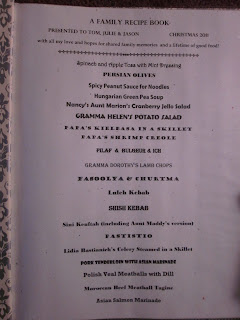Aibilene tells little Mae Mobley…
You is kind.
You is smart.
You is important.
 I read The Help
but I hadn't seen the movie and just watched the DVD after spotting it at
the library. So it surprised me when I
heard Aibilene say those words over and over — instilling self-esteem in
that little girl. I hadn't remembered those words from the book. I hadn't reacted the first time I heard her say them to the little girl in the film — but all of a sudden it struck me. She was brainwashing her in the most positive way and I only recognized it as
such because I’d used brainwashing myself when I first started teaching.
I read The Help
but I hadn't seen the movie and just watched the DVD after spotting it at
the library. So it surprised me when I
heard Aibilene say those words over and over — instilling self-esteem in
that little girl. I hadn't remembered those words from the book. I hadn't reacted the first time I heard her say them to the little girl in the film — but all of a sudden it struck me. She was brainwashing her in the most positive way and I only recognized it as
such because I’d used brainwashing myself when I first started teaching.
My first class of thirty-one kids. Everyone told me how slow and low the class was — low in scores, slow to learn. As
a rookie alternative-route teacher, I troubled over how to turn that around. I didn't start out thinking about brainwashing.
I just knew they had a sizable hurdle to get over academically
and while I’d try the best I could to advance their skills, as a newcomer, they were each
going to need something more.
At that time in New York, there were end-of-year tests, much like the
End-of-Grade (EOG) tests in North Carolina and everything rode on how well you
did on that test — for both student and teacher.
One morning I faced my class and said, “I want everyone to follow me and
do what I do.”
I held up one finger
(they held up one finger) and said out loud:
“I will stay calm.” And they repeated, “I will stay calm.”
I held up two fingers and they did as well.
“I will do great on
this test.”
“I will do GREAT on this test.” They repeated.
Three fingers: “I believe in myself and so does my teacher.”
“I believe in myself and so does my teacher.”
They looked around at one another, their eyes questioning,
their faces puzzled, their thoughts quiet. "Do it again and do it louder.” I instructed.
“I will stay calm!” They called out.
“I will do GREAT on this test!” Their voices rose.
“I believe in myself and so does MY TEACHER!” It was a chorus.
We continued to do this the first day and then every day, at
random throughout the morning and afternoon.
They thought it was a game. They
thought I was crazy, but for whatever reason, it made them smile. Whenever I just held up my fingers and then
called out “I WILL stay calm!” “I will
DO great on this test!” “I BELIEVE in
myself and so DOES my teacher!” they followed me in unison.
The next week I switched the order around and I stopped
saying the words. I just held up
two-three-or one finger and they had to respond. And respond they did. In some ways it was like a religious
call-and-response. We kept on with this
practice, their smiling faces singing out the words of reinforcement.
Then I told them they had to NOT say the words out loud but
only think them.
I held up my fingers, they held up their fingers and no one
said a thing. At times some faces crinkled up as if they were thinking
hard, other faces were calmer and still had their smiles. They were building a belief in themselves.
Finally it was time for the only one to be holding up any
fingers was me and no one said a thing. They just THOUGHT the thoughts. I had resorted to brainwashing.
We did this silent ritual before each
spelling test every week. Before the science quiz. Before the reading comprehension tests. Kids that
never did well started to do better.
Kids who did well did better. It
seemed crazy but I saw them improving. After report cards came
out that quarter pretty much everyone had done better than before.
Unexpectedly, after school, Carolina (pronounced caer-o-LEENA) came back into the classroom with her father. She said he wanted to see me. Carolina had to translate for her father because he didn't speak much
English.
“My father says he wants to know what you’re doing here.” she said shyly looking away from me. This was indicative of her Hispanic culture, children did not look
adults directly in the eye. I didn’t know this when I started teaching but
one day in the teacher’s lounge, complaining loudly how frustrated I was that I
couldn’t get some students to look at me when I was talking to them, one of my
colleagues explained that this was how they were taught — it was considered disrespectful.
I knew why Carolina wasn't looking at me but her father wasn't either.
Carolina was a pretty, shy girl, with pierced ears and a gentle manner. She never gave me any trouble in class and just came each day and sat at her desk and tried to do her work.
“I don’t understand the question Carolina,” I told her,
”Does he mean the subjects we study? Does your father want to know the schedule
of subjects for the day?” She translated
in Spanish and spoke in her usual soft voice.
“No,” she told me looking at her father while talking to me,
“He says that he doesn’t understand how I am getting A’s in spelling when I’ve
never had them before. He wants to know what you did.”
“Well tell him you’re
working very hard,” I said smiling at her through the translation, “and that we’re practicing how to do well
on our tests. Tell him I’m very proud
of the progress you’re making.”
As she turned toward her father, and prattled in rapid-fire Spanish, her beautiful white teeth began to show through her
lips and I could see that he saw that she was happy and then he looked straight
at me and I was happy and as he put his hat back on his head and rose from the
too small chair, he was smiling and happy, too.
When Aibilene in The
Help is forced to leave the household and her heart breaks at leaving sweet
Mae Mobley with a detached mother who shows her little love or affection, she
focuses hard on Mae, squats down and holds her at the shoulders and says firmly “Do you remember what I taught you? I need you to remember what I taught you.”
and the little girl responds back:
“You is kind. You is
smart. You is important.”
I hope my thirty-one kids (wherever they are) remembered as well.





.JPG)
.JPG)








